 Leading Blog | Posts by Month |
 Leading Blog | Posts by Month |
09.28.08

Fixing the Financial Crisis Once and For All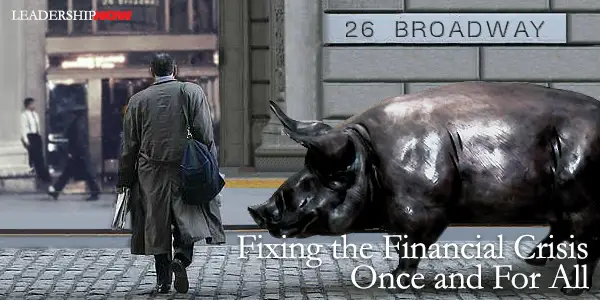
HOPING TO SOUND like leaders, Washington lawmakers want to get to the bottom of this financial crisis and create regulations to keep it from ever happening again. I don’t think it comes as any surprise to anyone that greed—on the part of both borrowers and lenders—is at the bottom of it. You can’t regulate greed out of existence. Regulation just improves creativity. Greed is regulated by character. Character is built at home, in our schools, in our churches, and yes, in our businesses. No one likes to talk about character because it isn’t a quick fix, it often goes against our inclinations, it’s not immediately measurable, you can’t take credit for it, and it’s a time consuming, never-ending process. George Eliot wrote in Middlemarch: “Character is not cut in marble; it is not something solid and unalterable. It is something living and changing.” It’s built-in individuals day by day in little, almost imperceptible ways over the course of a lifetime. The problem is that we have only given a patronizing nod to character and politely moved on with the business at hand. How will I get mine if I don’t play it like everyone else? We learn too late, without character, no one gets anything. 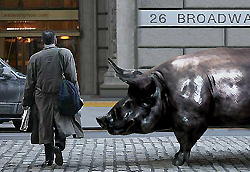 In July, Hugo Dixon opined in the Wall Street Journal, “Greed for higher returns entices investors to take risks; fear causes them to avoid excess. When markets are healthy, the two are finely balanced. Problems emerge when that balance is lost.” You will find character behind this balancing act. Character stabilizes both people and markets. Character is inseparable from the culture in which it is formed. Nothing will fix the financial crisis once and for all, but character will regulate it. Greed is a human issue and it will always be with us. It will always be something we need to train ourselves, our children, and our employees to regulate from within. The consequences can be devastating. Apparently, Mr. Gekko, greed is not good. Lou Mannheim was right, “The main thing about money, Bud, is that it makes you do things you don't want to do.” Or shouldn’t do.
Posted by Michael McKinney at 11:04 AM
09.26.08

Richard Branson: There Is No Reverse Gear On This Thing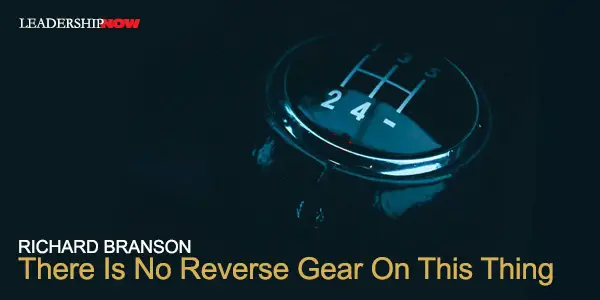
RICHARD BRANSON is the quintessential entrepreneur. Business Striped Bare is his candid account of what the Virgin companies are all about—what they hoped to do, what they actually did, how they got where they are, and why it matters. He shares the experiences and key principles that have brought him success (or not, and what he has learned from it). He explains: There are many ways to run a successful company. What works once may never work again. What everyone tells you never to do may just work, once. There are no rules. You don’t learn to walk by following rules. You learn by doing, and by falling over, and it’s because you fall over that you learn to save yourself from falling over. It’s the greatest thrill in the world and it runs away screaming at the first sight of bullet points….So all I can do for you now is map the territory I’ve seen. The good news is, I’ve covered a lot of territory.And he has. You will find great stories in here about how things came to be and almost didn’t. He covers a wide range of interrelated topics: people, getting the brand right, delivering on the brand, learning from mistakes, innovation, the value of entrepreneurs and leadership, the wider responsibility of business and his thoughts on success. Here are a few excerpts with common themes that can be applied in any context: A manager should basically be a considerate person who is as interested in the switchboard operator and the person who cleans the lavatories as he or she is in the fellow managers. In my view, a boss who is willing to party with all of their people—and pay attention to their personal concerns—has the makings of a great leader.Branson says the stakes have never been higher. No one in business can unmake anything. The first law of entrepreneurial business is “there is no reverse gear on this thing.” He shows how Virgin is trying to get it right and hopes you find inspiration in it. His book will definitely get your mind moving in new directions. 
Posted by Michael McKinney at 03:14 PM
09.25.08

Newswire: Lincoln's Leadership
Posted by Michael McKinney at 09:42 AM
09.24.08

Managing Brand You: It’s No Accident“Whatever your brand stands for, you have to deliver on the promise,” writes Richard Branson in Business Stripped Bare. “Don’t’ promise what you can’t deliver, and deliver everything you promise. That’s the only way you’ll ever control your brand. And beware: brands always mean something. If you don’t define what the brand means, a competitor will.” It’s no different on a personal level.We all have the opportunity to determine how others see us. We are in charge of our own brand. The space between how you are viewed by other people and how you want to be viewed by other people is the place where you begin to build your brand. “Brand YOU,” writes Jerry Wilson and Ira Blumenthal in Managing Brand You, “is about making choices regarding how you want to live your life and how to build the positive and favorable impressions you desire with your target audience.” Begin by asking your closest friends for a candid list of twenty-five words that best describe you and what you represent. Make your own list as well. How does it look? How does it compare to your brand identity? How you want to be perceived? Wilson and Blumenthal ask: Are you hoping one of your brand promises is reliability? Then why are you always late? Are you working to make sure those around you believe you are a team player? Then why do you never volunteer for a committee or activity? Is you perception of your personal brand that of a person who is logical, thoughtful, and contemplative? Then why do you make seat-of-the-pants, spur-of-the-moment decisions?Managing Brand You takes you through a valuable seven step process for defining, creating and implementing your personal brand. It is as much about reinvention and integrating your values, principles and beliefs with your actions—you brand essence. It’s about not letting your past control your future. Your brand should be built on your strengths with a grasp of areas where you need to improve in order to support your strengths. Simply put, to place yourself in the satisfying and successful life that you imagine, you need to find your inner drive and to discover the skills you have that can help you find your best space. Having a brand identity that is right for you is no accident. It begins by looking deep inside yourself to find out what motivates you and to discover the principles that guide your life. And it is equally important to recognize where you do not want to be, as it is to visualize where you want to be.Emphasis is placed on the importance of a consistent message over the long haul. They liken it to running a marathon race. It’s easy to get distracted from your goals by the inertia and pressures of your current brand. A brand is not a quickie makeover, but a long-term commitment to personal improvement.
Posted by Michael McKinney at 10:14 AM
09.22.08

Why Do Seemingly Smart People and Companies Make Such Blunders?In business, don’t we have structures in place that are designed to bring in a variety of expertise when making major decisions and ensure that no one person can send the business in the wrong direction? Don’t we do our due diligence?As a species we are not as rational as we would like to think. We tend to be overconfident, too quick to come to a conclusion and not inclined to learn from our mistakes. In the well-executed Billion-Dollar Lessons, Paul Carroll and Chunka Mui write that “humans are hardwired to come up with bad strategies.” Doing due diligence is extremely difficult because of these natural tendencies:
Inertia too, is a big contributor to poor strategy. The hoops that one has to jump through and layers of bureaucracy that have to be appeased “make it hard to derail a strategy once it has reached a certain point. It’s just too painful to go back and start over.” The authors say it is not enough to be aware of these issues. If we are to learn from our mistakes, there has to be some incentive to do so. 
Posted by Michael McKinney at 12:39 PM
09.19.08

Do You Suffer From Any of These Energy Drains?In our fast-paced, twenty-four hour society we are constantly distracted and diverted from working on what we should be working on. It creates lives of almost habitual scatteredness. Focus is the sine qua non of reaching our potential. This scatteredness is largely responsible for draining us of the energy we need to accomplish our goals. Additionally, in Success 101, John Maxwell outlines three difficult situations that we need to be aware of and learn to manage around:Activity Without Direction – doing things that don’t seem to matter Burden Without Action – not being able to do things that really matter Conflict Without Resolution – not being able to deal with what’s the matter These sap our energy because they chip away at our dignity and needlessly undermine our ability to focus. If we find ourselves faced with any of these difficult circumstances, we need to work extra hard to manage around them. The first step to accomplishing this is seeing the big picture and knowing our part in it. Knowing our purpose can insulate us from many of the external distractions we face on a daily basis. Maxwell writes, “The better you are at making sure you’re doing what you should be doing, the better chance you have for making an impact on others and being successful.” At the same time, not all stress is bad. We need to look for opportunities within our circumstances to expand our capacity. Loehr and Schwartz write in The Power of Full Engagement, that "Any form of stress that prompts discomfort has the potential to expand our capacity—physically, mentally, emotionally or spiritually—so long as it is followed by adequate recovery." It’s part of learning to manage yourself exceptionally well.
Posted by Michael McKinney at 09:46 AM
09.18.08

Out of Context: Leading People Through Change"Unless leaders take time to surface and resolve individual concerns, they will be unable to generate and maintain the momentum necessary for the change to be successful. One of the primary reasons many change efforts fail is because leaders do not step back and look at the change process and the transitions that are required from the perspective of the individuals involved. 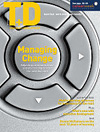 At any given time, different people are at different stages of concern relative to change. Predictably, they have information, personal, and implementation concerns at the front end of the change process. If a leader is able to diagnose stages of concern, then the leader can respond by communicating the right information at the right time, and therefore reduce resistance. When resistance goes down, buy-in goes up." —Merry Lee Olson
Compact Risk: Controlling the Perils of Change, T+D Magazine September 2008
Posted by Michael McKinney at 12:17 AM
09.17.08

Nice Guys Can Get the Corner OfficeApparently, Nice Guys Can Get the Corner Office. The problem isn’t being a nice guy (or gal), the problem is in finding the right balance. It’s having the emotional intelligence to know how to interact with others without “giving away the store.” This book is about finding that balance.According to the authors – Russ Edeloman, Timothy Hiltabiddle and Charles Manz - Nice Guy Syndrome is a big problem in today's workplace. 61% of people they surveyed said that they struggle with being too nice at work, and that they feel it has a negative impact on their success. Most of us like to be considered “nice.” We want to be liked. We equate it with traits like cooperativeness and agreeableness, but it often ends up being manifested in unproductive behaviors that come across as weak, passive and docile. This can create a whole new set of (passive-aggressive) issues as we try to cope with being marginalized. What is “niceness?” How should it look? The authors define it as:
Posted by Michael McKinney at 10:59 AM
09.15.08

Developing Diamonds in the RoughNancy Ortberg is an alumnus of Willow Creek Community Church and is a founding partner of TeamWorx2, a business and leadership consulting firm to businesses, schools, nonprofits, and churches. She has made a important observation concerning leadership development in her book, Unleashing the Power of Rubber Bands. Often in our search for new leaders we go looking for the finished product. She refers to Andy Stanley's comment that leaders always think that they can do a better job than you are doing. So that's a good place to start (unless we are taking ourselves too seriously). A leader's responsibility is to develop these diamonds in the rough. Ortberg writes:We need to keep our eyes open for leadership qualities: energy, dissatisfaction, new ideas, mistakes, and perhaps even a bit of cynicism. These are the raw materials in the making of a leader, not the finished product. Leadership development doe not necessarily start with strong leadership qualities like discipleship, maturity and wisdom. Those are the end products. We need to be looking for the drive without the experience, the vision before the patience, the energy minus the discipline. These are the building blocks, the clues that ell us there is a leader here, but so much still needs to be done.
Posted by Michael McKinney at 10:06 AM
09.12.08

Bad Is Stronger Than Good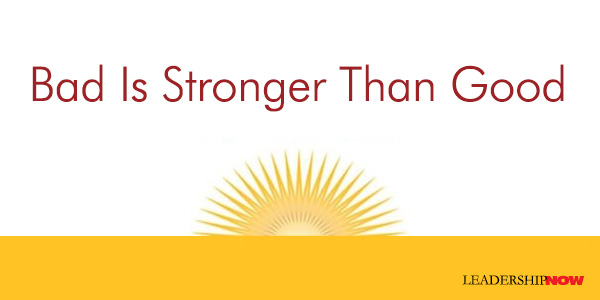
“Consequently,” writes Kim Cameron in Positive Leadership, “individuals in general—and especially leaders in organizations who are constantly confronted by problems, threats, and obstacles—have a tendency to focus on the negative much more than the positive.” But leaders need to think differently. Cameron continues: Positive leaders are unusual in that they choose to emphasize the uplifting and flourishing side of organizational life, even in the face of difficulty. It is not that they ignore the negative or adopt a Pollyannaish perspective, but they counter the tendency toward negativity with an abundance of positivity. In the absence of such emphasis, negative inclinations overwhelmed the positive and a negative climate is the default option. Positive leadership requires thinking that goes contrary to our natural tendencies. It requires an intentional effort to encourage behaviors that enable a positive climate. 
Posted by Michael McKinney at 03:44 PM
09.10.08

Are You a Socially Intelligent Leader?Daniel Goleman has an interesting article in the Harvard Business Review that updates his previous work on social intelligence and leadership. In Social Intelligence and the Biology of Leadership, Goleman writes that the most relevant finding coming out of social neuroscience is that “certain things leaders do—specifically, exhibit empathy and become attuned to others’ moods—literally affect both their own brain chemistry and that of their followers. Indeed, researchers have found that the leader-follower dynamic is not a case of two (or more) independent brains reacting consciously or unconsciously to each other. Rather, the individual minds become, in a sense, fused into a single system.”Not surprisingly, he writes, “Leading effectively is, in other words, less about mastering situations—or even mastering social skill sets—than about developing a genuine interest in and talent for fostering positive feelings in the people whose cooperation and support you need.” Authenticity is the key here. The discovery of mirror neurons by Italian neuroscientists has led us to the understanding that when we detect someone else’s emotions, our mirror neurons reproduce those same emotions creating a kind of shared experience. In a recent study, one group was given negative performance feedback with positive emotional signals; the other was given positive feedback but with negative emotional signals. Later, the first group reported feeling better about their performance than did the second group. Goleman concludes, that “if leaders hope to get the best out of their people, they should continue to be demanding but in ways that foster a positive mood in their teams….Here’s an example of what does work. It turns out that there’s a subset of mirror neurons whose only job is to detect other people’s smiles and laughter, prompting smiles and laughter in return. A boss who is self-controlled and humorless will rarely engage those neurons in his team members, but a boss who laughs and sets an easygoing tone puts those neurons to work, triggering spontaneous laughter and knitting his team together in the process…. [T]op-performing leaders elicited laughter from their subordinates three times as often, on average, as did midperforming leaders.” How can we become socially smarter? We improve by doing. Our behavior creates and develops neural networks, so we can strengthen and create new neural patterns by practicing being more socially aware and by fine-tuning our communication style. One might assume that women are better at this than men, but studies have found that “gender differences in social intelligence that are dramatic in the general population are all but absent among the most successful leaders.” The article is free and is found over at the Harvard Business Review web site. Related Interest:
Posted by Michael McKinney at 05:01 PM
09.08.08

Our Performances Matter: The Encore Effect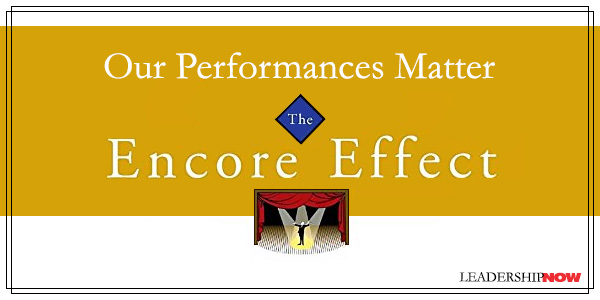
WHAT IS the encore effect? It is delivering what you do so well that you are asked to do it again and again. It’s people wanting more of what you do best. No matter what we do, we are showcasing who we are and what we care about. As we go through our day we can either deliver an average performance or a remarkable one. A remarkable performance keeps them coming back for more. Mark Sanborn, author of The Encore Effect, believes “Our performances matter. They can have a powerful impact on those around us. As parents, our performance shapes and influences our children. As employees and managers, our performance can make our company better, move a project forward, spark ideas among colleagues, and influence customers.” Of course, a remarkable performance can only come from someone who knows what they do best, and is passionate enough about it to have invested the time to develop expertise in it and to live it authentically. It’s who they are, and it’s infectious.How can each of us make our own performance bigger, better, and bolder? How can we make what we do consistently remarkable and thereby make a difference in our sphere of influence? Mark Sanborn offers five steps for making your performance remarkable; for bringing your best self to whatever you are doing: Passion: Passion is the fuel that drives our life’s purpose. Our passion for what we do pulls others along. “Nobody likes to be driven by someone else; it feels like being pushed. But when someone can show us how to be bigger on the inside—in our attitude and mindset—that can help attract or pull us toward what we can become. Prepare: How remarkable performance begins. “Each of us is creating our future right now. Whether the future is five minutes from now or five years, it is determined by our preparation—or lack of it.” Be a remarkable performance waiting to happen. Practice: “There are no perfect violinists—or salespeople, executives, teachers, or parents for that matter. But deliberate practice is what distinguishes those who excel from those who get by.” Perform: Be the performance. “One hallmark of a remarkable performance is authenticity.” Be yourself. Engage your audience by giving them your attention. “To create the Encore Effect, you shouldn’t be focused on your own happiness or success, but on the happiness and success of others.” Polish: The difference is in the details. “There are lots of details that matter when it comes to creating a remarkable performance.” Keep polishing what you do. Sanborn is no stranger to remarkable performances, and he continues to polish his life’s work. He also highlights some pitfalls that we need to avoid along the way, like arrogance, fear, and impatience. Most importantly, Sanborn points to the real goal of remarkable performances—helping others to achieve their own remarkable performances. “Remarkable performers see in others what they have discovered in themselves—the ability to reach unexplored and unanticipated levels of performance. They inspire others through their own performances, instruct others through their teaching, and help others improve through their encouragement." Pass this title along to others—young and old. It contains a simple idea that, taken to heart, can make a big difference. 
Posted by Michael McKinney at 02:33 PM
09.05.08

Bill Hybels on Growing as a LeaderI have little patience with leaders who get themselves into leadership binds and then confess that they haven’t read a leadership book in years. If you’re a serious-minded leader, you will read. You will read all you can. You will read when you feel like it, and you will read when you don’t. You will do whatever you have to do to increase your leadership input, because you know as well as I do that it will make you better.I’m often asked how, in addition to reading, to get better as a leader. And if I’m in a playful mood, I’ll sometimes say with a smile, “Just lead something!” The best way for leaders to get better is to lead something besides their “main thing.” When you use different muscles, you force your body to flex and develop in new ways. Leaders must invite the same type of cross training into their leadership development regimen. The more varied the environments in which you exercise your leadership gift, the stronger that gift will become. Lead something besides your main thing. You will become a far more effective leader. Adapted from Axiom: Powerful Leadership Proverbs by Bill Hybels.
Posted by Michael McKinney at 12:00 AM
09.04.08

Out of Context: A Person of CharacterMarvin Olasky writes in the American Leadership Tradition about the need for moral leadership: Americans of the eighteenth and nineteenth centuries generally understood that if great Solomon’s reign could disintegrate, how much more readily could the tarnished lives of lesser leaders send their lands spiraling downward! Voters at first took into account the religious beliefs and sexual practices of prospective statesmen, generally electing men like Andrew Jackson and turning down those like Henry Clay when they went head-to-head. But the common sense of past generations has become uncommon. Novelist Larry McMurtry wrote in 1975 that “one seldom, nowadays, hears anyone described as ‘a person of character.’ The concept goes with an ideal of maturity, discipline and integration that strongly implies repression: people of character, after all, cannot do just anything, and an ability to do just about anything with just about anyone—in the name, perhaps, of Human Potential—is certainly one of the most moderne abilities."
Posted by Michael McKinney at 07:41 AM
09.02.08

5 Leadership Lessons: The First Billion Is the Hardest Now at eighty, T. Boone Pickens looks back on his past, his comeback and future in The First Billion Is the Hardest. (I don’t know about you, but I’ve found that to be so true.) He also shares a few thoughts on leadership and management:
Posted by Michael McKinney at 07:50 AM
09.01.08

Leadership Books: September 2008Here's a look at some of the best leadership books to be released in September.




Posted by Michael McKinney at 12:04 AM
|
BUILD YOUR KNOWLEDGE
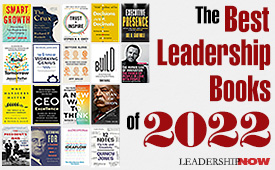

How to Do Your Start-Up Right STRAIGHT TALK FOR START-UPS 
Grow Your Leadership Skills NEW AND UPCOMING LEADERSHIP BOOKS 
Leadership Minute BITE-SIZE CONCEPTS YOU CAN CHEW ON 
Classic Leadership Books BOOKS TO READ BEFORE YOU LEAD |
|